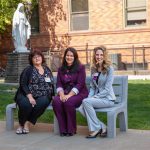There’s a deeply rooted misconception that if youth are educated about sex, they’re more likely to engage in it—yet research shows that when young people are empowered with knowledge about reproductive health, pregnancy rates go down.
In a new study published in PLOS One, a team of University of Pittsburgh School of Public Health researchers found that the benefits don’t end there. In fact, comprehensive sexuality education has the potential to strengthen young peoples’ families, schools and communities as well.

Dr. Sara Baumann
The team led by Dr. Sara Baumann, assistant professor in Pitt Public Health’s Department of Behavioral and Community Health Sciences, examined the effects of a unique program working with school communities in rural Madagascar. Rates of child pregnancy and child marriage are high in these areas, and adolescents have limited access to health information, quality education and youth-friendly services.
Amid these challenges, the nonprofit Projet Jeune Leader (PJL), a Pitt Public Health collaborating partner over the past four years, provides in-school comprehensive sexuality education to adolescents. The project embeds trained youth leaders within schools and communities to deliver engaging, youth-centered, in-school curricula full of games, songs and other fun, interactive activities. PJL also supports students in balancing school and extracurricular interests, conducts parent-teacher sessions and teaches students healthy strategies for navigating relationships.
“The kids clearly love PJL educators,” said Baumann. “They’re just a few years older than the students. Having relatable messengers seems to have helped a lot.”
Over the course of two years, Baumann and her coauthors, which include two PJL members in Madagascar and senior author Dr. Jessica Burke, Pitt Public Health vice dean and professor of behavioral and community health sciences, measured the program’s broader impacts through human-centered design workshops with 90 principals and administrators across 45 schools.
The Pitt team found that after exposure to the PJL curriculum, students’ school attendance and test scores increased, and balancing schoolwork and extracurriculars has gotten easier. Additionally, the youths are learning to be better problem-solvers and communicators, and those tangible skills are leading to stronger social support systems, said Baumann.
“The program is affecting school and family dynamics. There’s stronger solidarity in the kids’ relationships with their teachers as well as their parents. So, while comprehensive sexuality education is a critical tool for the adolescents, there are also wonderful spillover effects.”
“It’s so wonderful that our partnership and PJL’s amazing work will reach broad audiences,” said Burke. “Hopefully, this will inspire others to implement similar comprehensive sexuality education programming and research-practice collaborations.”









